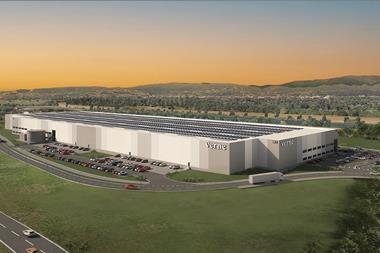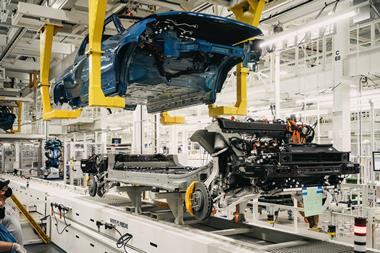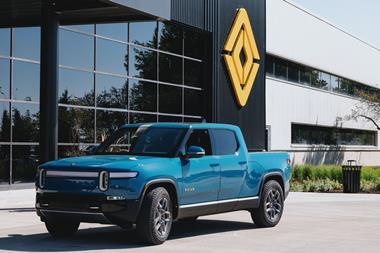Rivian’s $6.6 billion loan from the US Department of Energy bolsters its ambitious plans for a key Georgia manufacturing hub. The 9 million sq. ft facility will increase production of next-gen EVs, foster innovation and boost regional production.

Rivian is moving to fortify its position in the electric vehicle (EV) industry by securing a $6.6 billion loan from the US Department of Energy (DOE). The financing, part of the Advanced Technology Vehicles Manufacturing programme, (ATVM) is earmarked for the construction of a state-of-the-art manufacturing facility in Stanton Springs North, near Social Circle, Georgia. The development confirms Rivian’s strategic drive to scale production, innovate, and bolster US leadership in global EV manufacturing.
The 9 million sq. ft plant will focus on producing Rivian’s all-electric midsize platform, starting with the R2 SUV and R3 crossover. When fully operational, the facility is expected to manufacture up to 400,000 vehicles annually, contributing significantly to the rapidly expanding US EV market. Rivian’s founder and CEO RJ Scaringe emphasised, “This additional capacity for our mass market products is key to US leadership in the electric vehicle industry.”
Georgia as a strategic location for EV production growth

The choice of Georgia is no coincidence. The state has aggressively pursued automotive investments with attractive tax incentives, workforce training programmes, and robust infrastructure. Located less than an hour from Atlanta, the Stanton Springs site is set to generate 7,500 direct jobs by 2030, along with thousands of indirect roles.
The project’s ripple effect is expected to boost the local economy while reinforcing the Biden-Harris administration’s focus on clean energy initiatives, all hinging, however, on the status of the controversial decisions expected to be taken by the Trump team.
“People are incredibly excited to get behind the wheel of our new models. This additional capacity for our mass market products is key to US leadership in the electric vehicle industry”
- RJ Scaringe, Founder & CEO, Rivian
Looking forward with optimism, however, Rivian is collaborating with local institutions, such as Georgia’s QuickStart technical training programme, to prepare a skilled EV-capable and digitally-ready workforce. Twenty local fellows have already commenced training at Rivian’s Illinois facility and will return to Georgia upon its completion. “This investment will provide thousands of jobs and strengthen America’s leadership in clean transportation,” stated a DOE spokesperson.
Federal backing of EVs, advanced automation and sustainable manufacturing
The DOE’s ATVM programme, which previously aided Tesla in 2009, points to the government’s confidence in the EV maker. The loan’s dual-tranche structure allows Rivian to draw $3.35 billion during the first phase of construction and $2.62 billion in the second. The facility will incorporate advanced automation and renewable energy, setting a benchmark for sustainable manufacturing.
The investment also aligns with broader federal goals, including the Justice40 Initiative, which ensures 40% of certain climate-related federal investments benefit disadvantaged communities. Rivian plans to hire at least a quarter of its employees from local communities, further strengthening ties with the region.

Rivian’s competitive edge: Advanced EV manufacturing, batteries and R&D
In the high-stakes EV race, Rivian faces competition from established players like Tesla and emerging global rivals. Yet the DOE loan’s magnitude reflects a strong vote of confidence in the company’s ability to innovate and execute. The new facility will feature an R&D wing dedicated to advancing battery technology and refining manufacturing processes, ensuring Rivian remains at the forefront of EV innovation.
Rivian’s decision to delay construction on its Georgia facility in 2024, initially to cut costs, is now viewed as a strategic recalibration. With the DOE loan, Rivian is in a position to achieve economies of scale and enhance cost competitiveness, positioning itself as a serious contender in international markets.
Read More Rivian Stories
- Rivian and Volkswagen Group JV to create electric architectures and software
- Can Rivian navigate production challenges in the EV world?
- Rivian secures $827m funding, plans expansion and brings in new COO
- New world order: How the US is boosting EV production with new technologies and investment
The project’s scale, however, comes with challenges. Supply chain disruptions, inflation, and regulatory hurdles could complicate timelines. Additionally, Rivian must demonstrate it can meet ambitious production targets without compromising quality. The first R2 SUVs are expected to roll off the line in 2028, two years after construction begins in 2026. Despite these challenges, the facility’s long-term impact is expected to be transformative.
The EVs manufactured in Georgia will reportedly save 146 million gallons of petroleum annually, contributing significantly to environmental sustainability. Rivian’s partnership with the DOE illustrates the critical role of public-private collaboration in the transition to a zero-emission future.
As Scaringe aptly summarised, “People are incredibly excited to get behind the wheel of our new models. This additional capacity for our mass market products is key to US leadership in the electric vehicle industry.”






































No comments yet